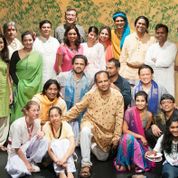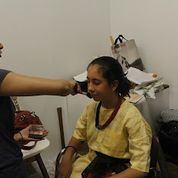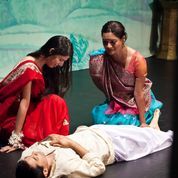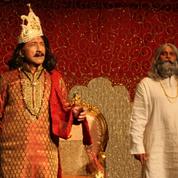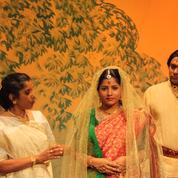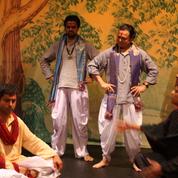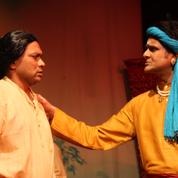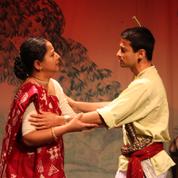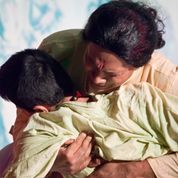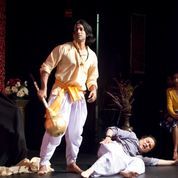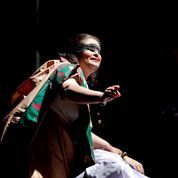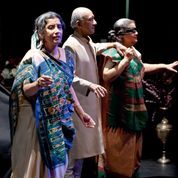Contribute
| An Epic Journey – SETU's Dramatization Of Mahabharata Is A Resounding Success! |
Shuchita Rao
09/25/2012
The dramatization of the famous Indian epic, the Mahabharata by Belmont, Mass based director Subrata Das and his team of 25 actors was a commendable one. SETU (Stage Ensemble Theatre Unit), a non-profit theatre group in Boston area staged the English play at the Arsenal Center of Arts in Watertown, MA earlier this month. Seema Jain produced the play which was received extremely well by the Boston audience.
Subrata Das, director of the play, explained his standpoint on the dramatization of Mahabharata in the following manner. “Mahabharata is not a work of religious instruction. It is much greater; it is a work of art. The central story focuses on the feud over a throne between two dynasties who were related, a feud between cousins that ended in war and great destruction. It is a highly sophisticated repository of mankind's sacred knowledge. The political, philosophical and socio-cultural messages of Mahabharata remain universal and timeless. The heroes of Mahabharata, like the heroes of other ancient epics of the world emabrk on the quest of justice against evil. Our live theatrical performance of this great story is an effort for us to uphold this universality in Indian and Western Culture.â€
Even though the long and complex epic was condensed to just fourteen scenes staged in 2.5 hours, it held strong due to careful choice of the most suitable and crucial events to be presented. Narrations by “sutradhaars†between the 14 scenes also helped tie several different parts of the story together right from the birth of Pandavas to the war between the Pandavas and Kauravas and their meeting in heaven after the war.
The sheer power of the story shone bright and brought to life myriad human emotions of love, grace, jealousy, rivalry, hatred and greed by the combined effort of 25 local actors. The team had clearly put in an enormous amount of effort and zeal into all aspects of the production. It was remarkable to see the unfailing results of practiced delivery of dialogues in well modulated voices – not once did any actor forget his/her lines to be recalled from memory. The portrayal of emotion through powerful facial gestures, body postures and stances reflected the interesting personalities of the powerful characters in the epic. Brisk physical movement across the stage was called to action when needed such as in the scenes of death of Duryodhan and Abhimanyu, the son of Arjun.
The script from an English translation of Mahabharata by Peter Brook was rich in the use of poetic language and the costumes and accessories were appropriate in representing a royal era. For instance, the silver hair-wig represented old age in a fitting manner, a black costume for Uncle Sakuni suitable to show a mind with evil and dark intentions and a richly brocaded red and green sari showed off young Draupadi as a coy and gorgeously dressed bride. A change of actors such as portrayal of Kunti in her youth by a younger actor and Kunti as a mother played by an older actor showed the passage of time in a clever manner.
The seating capacity of the Arsenal theatre was modest – it seated at the most, probably 75 people. A 20 feet tall backdrop with a giant hand-painted tree added a touch of grandeur to a small stage that established proximity between the actors and the audience like in age-old Indian folk theatre setting. Stark black floor with minimal props, the rustic roof with heating pipes jutting through the ceiling, change of scenes by turning off lights, intelligent use of spotlights to focus on important actors and the creative use of soft piped classical music added to the overall high quality of the play.
Naomi Ellenberg-Dukas, who watched the play on the opening night said “Mahabharata was a complicated story but at the same time a very universal one. I am truly amazed that Subrata Das managed to do so much with meagre funds – his cast must indeed be very dedicated to putting in effort to dramatize the story.†Meena Singh , another member of audience commented “I am very happy to be here. I was torn to pieces and driven to tears particularly during Draupadi's disrobing scene. The actors have done a wonderful job.†Several facebook posts also commended the SETU team on their efforts while the play was being staged as well as after the evening performances on Sep 7, 8 and 9 were completed.
As a child, director Subrata Das claims to have spent much time resting his head on his mother's lap, mesmerized by her recitations of the story of Mahabharata. He says that he has lately turned to the Bhagvad Gita in his search for a deeper philosophical meaning of life. Das has acted in and directed several plays including Tendulkar's Kamala, Girish Karnad's Hayavadana, Tagore's Karna-Kunti Sambad. Most recently, he has written and directed and published the play Rape, Regret and Retribution. He is now in the process of making a short film based on his own script, Capitalistic Indulgence. Lokvani congratulates Subrata Das and his team and Boston audiences eagerly await more of SETU's theatre productions.
You may also access this article through our web-site http://www.lokvani.com/
